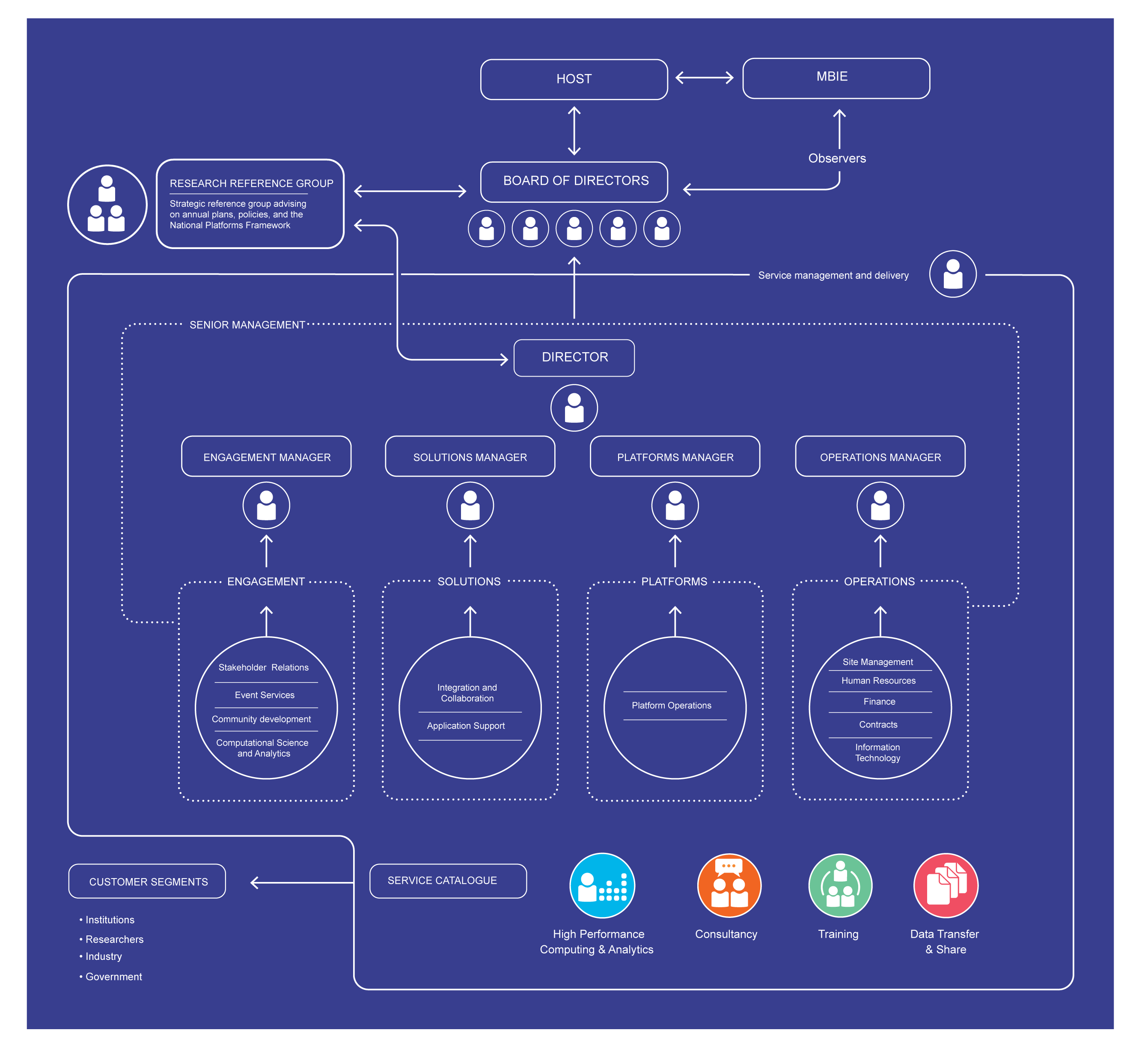Organisational health
NeSI supports a wide range of communities and disciplines through better, more efficient coordination and cooperation across the research sector. As an organisation, NeSI is passionate about building and strengthening connections that accelerate research in New Zealand.
Late in 2018, NeSI reached out to research leaders across New Zealand to understand the future needs of the country’s eResearch ecosystem. These consultation activities continued in 2019 with a focus on further strengthening NeSI’s connections with research communities and deepening NeSI’s understanding of long-term needs and aspirations of New Zealand’s researchers. All of this feeds into how NeSI operates as a distributed team and national organisation.
Building expertise within the NeSI Team
One of the main ways NeSI creates, maintains and grows its connections within the research sector is through its distributed and multi-disciplinary team. In 2019, recruitment of key team members who brought specialised expertise, adaptable skills, and established networks enabled NeSI to deepen its knowledge base and strengthen its connection into research communities.
Following the retirement of Michael Uddstrom, NeSI’s Platforms Manager, in January 2019, NeSI used the opportunity to recruit for two specialised positions in collaboration with NIWA that would expand each organisation’s capabilities. Fabrice Cantos, the NeSI/NIWA Site Manager at the time, accepted the role of HPC Operations Manager to oversee the national HPC facility and systems engineering staff. This helped retain Fabrice’s expertise and familiarity with the systems and the existing research communities they serve.
To complement Fabrice’s role, NeSI and NIWA welcomed Jeff Zais from Lenovo’s HPC Benchmarking Team in the United States. With 25+ years experience as a technical, strategic and business leader in HPC, Jeff’s addition to the team as Senior Science Advisor and HPC Architect will help NeSI focus on mapping and connecting science needs to current and future equipment.
Georgina Rae, NeSI’s Science Engagement Manager, went on maternity leave in November. To cover that leave, Kim Frew joined the team from Fonterra, where she led their advanced analytics strategy.
Another strategic hire in 2019 welcomed Megan Guidry, an Auckland Bioengineering Institute alumni, to better facilitate, sustain, and scale digital skills training activities within New Zealand’s research communities.
Marko Laban also joined NeSI in 2019, bringing more than 20 years software experience to mature the development and delivery processes behind NeSI’s services, and ensure new solutions are developed in connection with research community needs.
Brian Flaherty became a permanent member of the NeSI team during 2019 in the role of product manager for data services and has been key to get focus for growing the data transfer service while defining the needs around data storage, data sharing, and data security.
Other roles made permanent included Dinindu Senanayake as a Genomics Application Support Specialist, and Callum Walley as an Engineering Application Support Specialist. Their roles were the first domain-specific support roles created at NeSI and they have delivered a significant impact through targeted support, strengthened relationships, and broadened uptake of NeSI services.
Improving NeSI services through user-driven insights
Using insights from its consultation activities, NeSI has improved its responses to users’ short-term needs and enhanced its user experience by employing product management strategies and techniques used by industry leaders.
User journeys and service blueprints were developed to chart out the pathways that researchers would typically experience while using NeSI; user experience surveys were sent in a more timely manner; system monitoring was enhanced to proactively help users. The first half of 2019 saw NeSI facing challenges of onboarding new users due to compounding issues around its login system design. With the help of the techniques mentioned above, NeSI was able to quickly deliver an improved user experience, and continues to strive to be more metric-driven.
All of these long-term and short-term insights help NeSI understand the eResearch ecosystem through the lens of frameworks and abstractions. One of the key takeaways for NeSI was to understand that oftentimes innovation happens in the edges, and that these abstractions are a means to get closer to the underlying complexity, not to trivialise and make researchers fit NeSI’s model. Early in 2020, a core group of the NeSI team was sent to Berkeley, California for product management training in hopes to further develop NeSI’s practices going forward.
Internally, NeSI spent much of 2019 developing important refinements to its internal services reporting and data analytics capabilities.
These changes have not only helped identify opportunities for increased engagement and contributions across the NeSI Team, it has also resulted in richer and more timely reporting to NeSI stakeholders and partners.
Organisational design
NeSI operates as a virtual organisation (by contract) with teams formed along functional lines.






